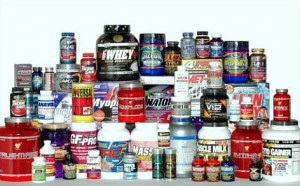WEIGHT TRAINING SUPPLEMENTS

Information on weight training supplements is abundant yet confusing, misleading and dishonest. If you look at magazine ads, they have you believe that there supplement is the answer to your prayers irrespective of your individuality or reality.
The truth of the matter is, however, that no product will work for you unless your essential nutrient needs are being met. So weight training supplements should first focus on fulfilling nutrient needs a diet isn't delivering.
Once nutrient needs are met, supplements that truly compliment certain physiological processes (many do not) can be utilized. It's important, though, to know how to identify scams.
Supplements for complete nutrition
So which types of weight training supplements till nutritional gaps? The answer is those that provide essential nutrients. Such weight training supplements include multi vitamins, anti oxidants, minerals, protein powders and meal replacements.
Vitamin and mineral supplements
It's my belief that few people get sufficient vitamins and minerals from their diet. As such, most people can benefit from vitamin and mineral supplements.
Along with a multi vitamin and mineral supplement, extra antioxidants and minerals like vitamin C, vitamin D, and Zinc are the most common of these supplements used. The multi is used as a cover all, vitamin D for things like lacking sunlight, while vitamin C and Zinc are often used for immune support.
as far as quality is concerned. slight variation probably exists among vitamin/mineral supplements. The United States Pharmacopeia designation (USP) , however, usually ensures sufficient quality.
Protein powders and meal replacements
It's not uncommon for meals on the go and/or of dieters to be deficient in protein; especially if weight training. For these people, protein powders and meal replacements can provide adequate protein/nutrition conveniently if the products are of sufficient quality.
A quality protein-powder/meal-replacement is usually determined by protein/carbohydrate ratio, protein source, carbohydrate source, and trans-fat content.
Protein/carbohydrate ratio
For a pure protein powder (not a meal replacement), protein should pretty much be the vast majority of the contents. While meal-replacements should be comprised of protein to a degree of 50 percent or greater.
Protein source
First and foremost, a protein source mustn't irritate; meaning it shouldn't cause a negative gut/allergenic response. If either occur, give it to a buddy who isn't sensitive. Secondly, it should come from a source rated high on any of the following 3 scales: PER (protein.efficiency ratio) , BV (biological value) , and PDCAA (protein digestibility corrected amino acid score).
Carbohydrate source
Whatever carbohydrate source is used should be a smaller proportion of calories than protein and not contribute to fat gain. A protein to carbohydrate ratio of 1:09 or greater should be the standard. As far as far gain is concerned, glycemic/insulin response and sugar content are the determinant factors; so maltodextrin, sugar and fructose should be minimal.
Trans-fat content
Beware of hydrogenated/partially hydrogenated anything!
Complimentary supplements
These are the weight training supplements that get the most sensational advertising. Espousing benefits ranging from anabolic properties to fat-loss based upon "research" accompanied by very convincing language. Within these claims and the research itself are clues, however, as to how much of a scam the ad is. Differentiating the scams from honest claims helps prevent wasting time and money.
Clues in the claims
As sleazy as the people behind these ads might be, they can't flat out lie in print. So what they do is "strongly imply" that their product will produce amazing results based on one/some elements of research. Words like "might", "possibly", and "suggest" accompany descriptions of the "amazing results" you seek. Statements like "some research SUGGESTS substance A (an ingredient in their product) can result in 3000% more muscle" are common headlines. Usually the abundance of such statements is proportional to how big of a scam the ad is.
Clues in the research
When statements such as that above are presented, somewhere in the ad is a citing of the research; usually in near-unreadable font. Such obscure citing is done to fulfill "ethical/legal-obligations" without making key research facts apparent. Key facts like dung-beatles or malnourished-pigmies being the focus of the cited research!
To take home
Weight training supplements are meant to either complete nutrition and/or compliment health beyond complete nutrition. Supplements like multi vitamins, protein shakes, and meal replacements aim to complete essential nutrition. Supplements beyond that are ever growing so knowledge of how to distinguish legitimate weight training supplements from scams is important.